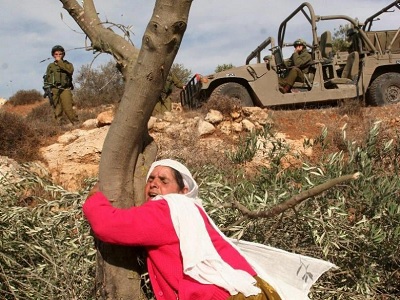As a climate justice movement our vision for the world is one where everyone can live freely, have access to all resources they need to survive and thrive, and where everyone is protected from the worst impacts of climate change. We strive for justice and work for not only a carbon emissions free future, but a world free of the injustice that has caused the crisis – and this includes militarism and imperialism.
As the climate crisis intensifies, the Global South and Palestinians living under oppression face disproportionate and dire impacts. These impacts are exacerbated by military occupation, bombs, displacement and land theft.
Palestinians have lived under a decades long illegal military occupation and apartheid regime.
Climate justice entails the right of a people to have control and self determination over their land and resources, none of which Palestinians are granted.
Abeer Butmeh from Friends of the Earth Palestine says, ‘In my work coordinating Palestinian environmental organisations, I witness daily that for Palestinians, climate change is not just a natural phenomenon, but a political one.’
The Unlivable Gaza Strip
In 2020, the Gaza strip where 2 million Palestinians live in an ‘open air prison’, had already been declared unlivable by the UN. It is a 365 square kilometre coastal strip under a total land, sea and air blockade by Israeli military forces. Gaza has an acute shortage of potable water, not only because of the growing climate impacts in the Eastern Mediterranean region but because Israel does not allow essential water treatment supplies to enter Gaza. 97% of Gaza’s water was unfit for human consumption before the current crisis. Now, there is a critical shortage and UN agencies fear a cholera outbreak.
Critical food shortages are also exacerbated by climate change and the occupation. Israel’s military prevents Palestinians from using most of the arable land and has targeted farmlands with dangerous herbicides.
A study published by Friends of the Earth Palestine found that Israel’s 2014 bombing campaign on Gaza caused extensive soil damage that reduced agricultural productivity.
We know warming waters and shifting ocean currents are displacing fish populations. Palestinian fishermen are not allowed to fish more than 15 nautical miles off the coast of Gaza. The consequences of doing so have been fatal for some. This has caused a near collapse of the Gaza fishing industry, a crucial food source.
Extreme heat, sea level rise and unpredictable weather are intensifying in the Middle East which has seen an average 1.5C rise in average temperatures. However Palestinian communities are some of the least equipped to adapt to it.
The Occupied West Bank
While Gaza has been under siege for nearly 17 years, communities under the occupied Palestinian territories in the West Bank also suffer climate and human rights injustices.
The Occupation Of Water
The occupation exacerbates the climate risks Palestinians face by denying them the right to manage their land and water. Israel controls more than 60 percent of the land in the West Bank, it systematically steals and destroys Palestinian land and water, enabling its 600 thousand settlers to consume six times as much access to water as the West Bank’s 2.9 million Palestinian residents.
Amnesty International’s 2017 report ‘The Occupation of Water’ details how Palestinian’s living under military laws are denied water access.
“Palestinians living under Israel’s military occupation continue to suffer the devastating consequences of this order until today. They are unable to drill new water wells, install pumps or deepen existing wells, in addition to being denied access to the Jordan River and fresh water springs. Israel even controls the collection of rainwater throughout most of the West Bank, and rainwater harvesting cisterns owned by Palestinian communities are often destroyed by the Israeli army. As a result, some 180 Palestinian communities in rural areas in the occupied West Bank have no access to running water.”
Agricultural Destruction
The Israeli Government has also justified seizure of land on environmental grounds, including seizing Bedouin land for afforestation projects.
Recently the Guardian published an article about a land grab strategy that involves agricultural destruction to sever ties with land to drive Bedouins out and make way for settlers.
This is reminiscent of Israel’s uprooting of hundreds of thousands of olive trees since 1967 and replacing them with imported trees to “efface all traces of Palestinian existence.”
Olive production and harvesting is a core part of Palestinian economy, culture and a symbol of connection to their homelands. These land grabs pose grave risks for Palestinians plus their adaptability and resilience to future climate risks.

A Palestinian woman protecting an olive tree from destruction. Photo: intifada.de via Frank M. Rafik on Flickr (CC BY-NC-SA).
Australia’s role
As a movement for justice we know that climate inequalities aren’t just about the disproportionate emissions and fossil fuels Western countries create but also the systems we enforce that exacerbate these inequalities. Our role in enforcing militarism and invasion of countries like Iraq and Afghanistan has contributed to destruction of economies, displacements and deaths of millions of civilians.
To date, the Albanese Government has failed to hold the state of Israel to account for its war crimes and call for a permanent ceasefire. Every day that we fail to do so, we are aiding in the death and displacement of innocent people. Beyond a ceasefire, we must support justice and freedom for Palestinians and an end to illegal occupation.
